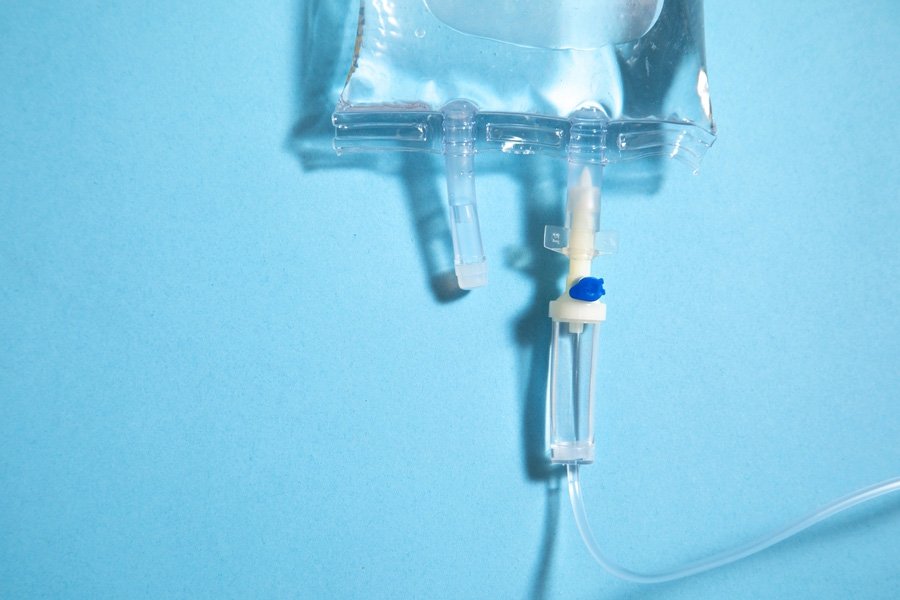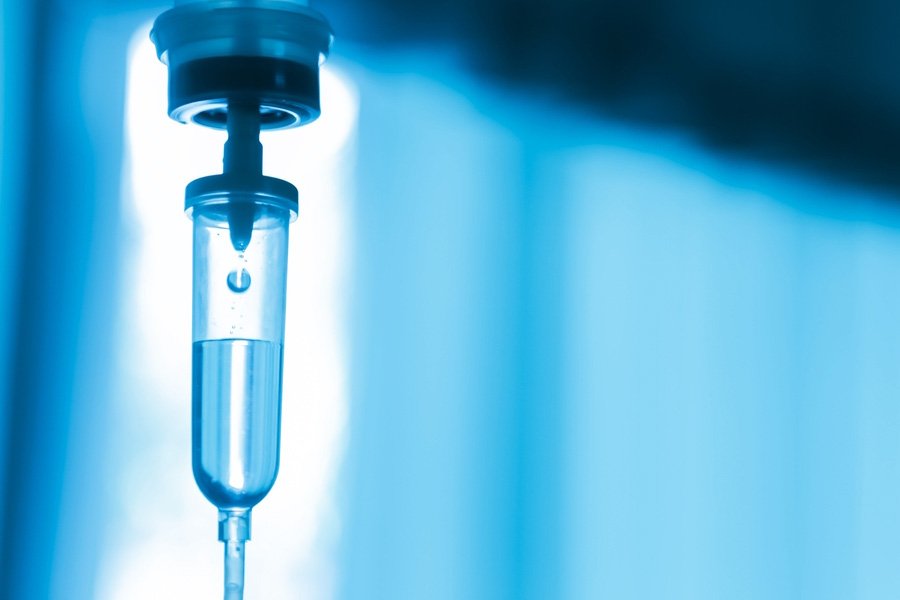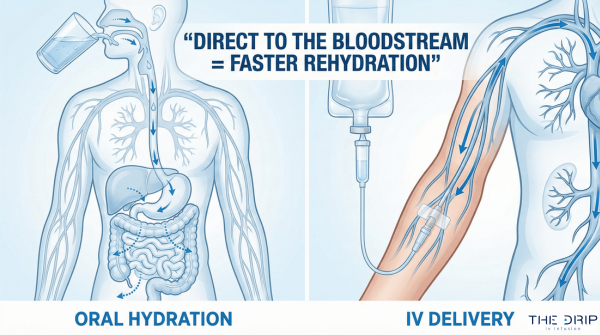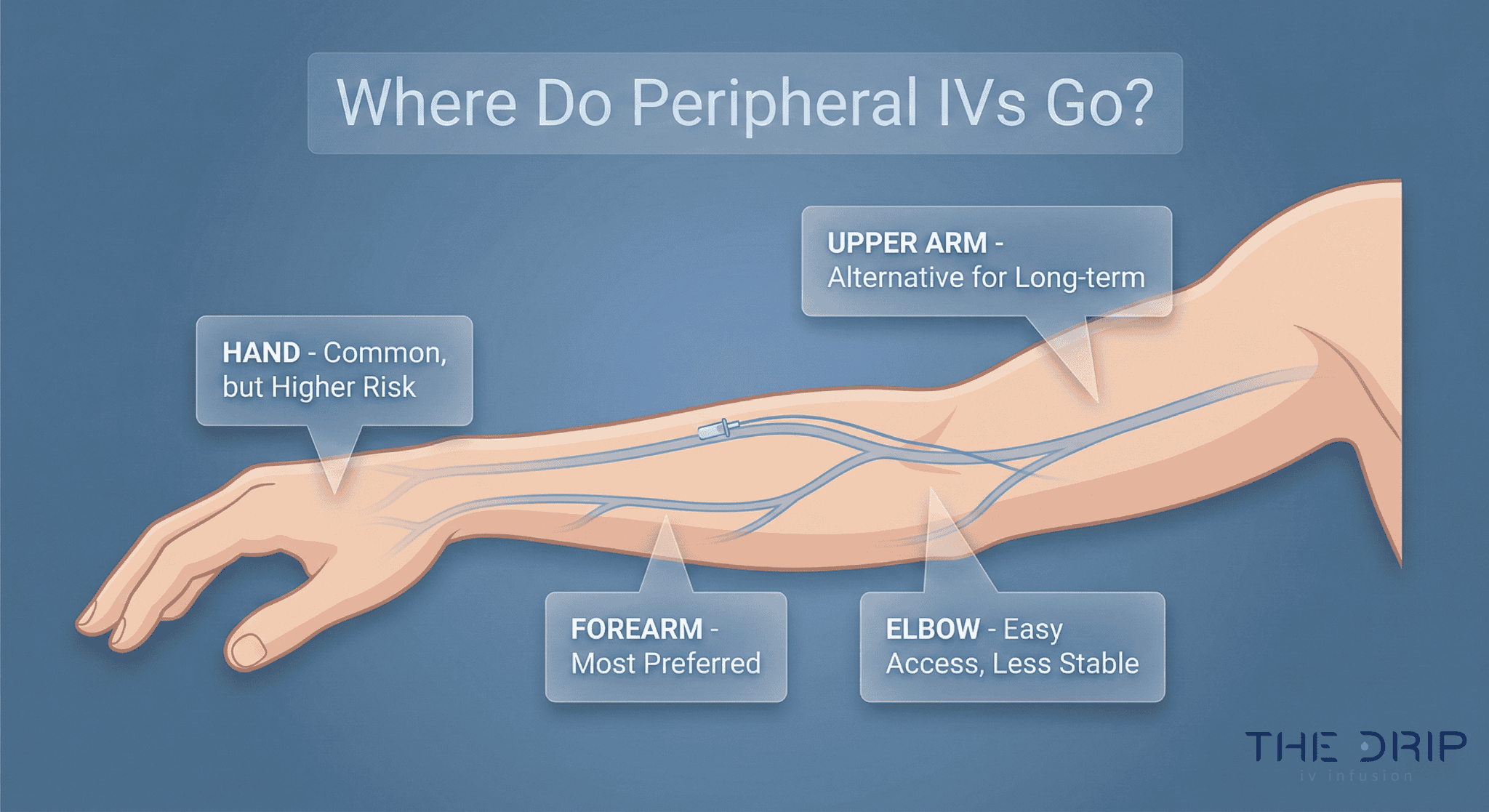IV therapy is one of the fastest and most effective ways to get the necessary vitamins and nutrients into the body. But how long does IV therapy last, and how long will you feel the benefits of IV fluids?
Continue reading to find out the effects and benefits of this therapy. In addition, you will receive useful tips on preparing for IV therapy and what measures to take afterward.
How Long Does IV Therapy Last?
In general, the duration of IV therapy ranges between 15 and 90 minutes. Keep in mind that numerous factors determine the duration of such therapy.
First, how long the therapy will last depends on your health condition and the type of IV therapy. Other factors, such as age and weight, also play a role in the duration of this therapy.

Source: shutterstock.com / Photo Contributor: ANDRANIK HAKOBYAN
How Long Do IV Fluids Stay in the Body?
After you receive IV therapy, the fluids can stay in your body for several hours. However, you should take this information with a grain of salt because several factors affect the retention of IV fluids.
So how long does IV therapy last? In some patients, intravenous treatment lifespan is several days, even months. In the following, there are presented the most common factors that affect the process:
The level of hydration
IV infusion duration primarily depends on the body’s hydration level. Namely, IV fluids will not stay long if you take enough water into your body. On the other hand, if you are not taking in enough fluids or have a health condition that has caused dehydration, IV fluids will be retained for a longer time.
Basal metabolic rate
Metabolism is an important factor that plays a role in IV fluid retention. Namely, the basal metabolic rate refers to the number of calories burned at rest. According to this rate, those individuals who have a high BMR mean they process fluids faster than those individuals who have a lower basal metabolic rate.
For example, those people who engage in frequent physical activity tend to burn calories faster than others. Therefore, IV fluids do not stay in the body for long in such individuals. On the other hand, in individuals with a low BMR, IV fluids will be retained for longer. This group includes elderly or overweight people.
Illness
Certain Illnesses and impaired health conditions largely determine the retention of IV fluids in the body. Namely, some health conditions, such as vomiting, diarrhea, and excessive urination, lead to a significant loss of liquids. In addition, receiving diuretics can further worsen the condition and leave you dehydrated.
In such cases, IV therapy should be an excellent opportunity to replace lost fluids and nutrients. By doing so, IV fluids will stay in your body longer.
Infections
Although unlikely, infections can cause your health to deteriorate. Namely, infections in IV therapy can occur if you do not work in a sterile environment and without sterile instruments. They usually appear at the injection site. In this way, the infection through the bloodstream can spread to other parts of the body and cause serious health problems.
Therefore, you should immediately consult your doctor if you have pain and swelling at the injection site or experience fever symptoms. In addition, to prevent such conditions, it is best to familiarize yourself with the health staff who will provide you with this type of therapy.
Remember that IV therapy should only be performed by experienced licensed medical professionals.

Source: shutterstock.com / Photo Contributor: ANN PATCHANAN
How Much Does IV Therapy Cost?
The cost of IV therapy depends on several factors. The composition of the therapy, the place where you get it, and the quantity of the IV fluids are just some factors that play a role in price formation.
The costs of IV therapy can be high, especially if you would like to receive mobile IV therapy. In this case, you may have to pay additional costs in addition to the therapy. On average, the price starts from $100.
If you still decide on such therapy, it is best to consult your doctor first. In many cases, you may not need IV therapy. Therefore, after examining you, your doctor will let you know if you are an ideal candidate for this type of therapy.
What Are the Benefits of IV Therapy?
IV therapy is an effective way to get the necessary vitamins, minerals, and nutrients. Unlike oral intake, this type of therapy allows fluids to be delivered to the rest of the body through the bloodstream. In addition to this main advantage, IV therapy offers many other benefits that you can get. The most important potential benefits include:
IV therapy according to your health condition
Adjustment of IV fluids is one of the main benefits of this therapy. Remember that IV therapy is not universal for everyone and can be adjusted according to several parameters. Some parameters include diet, health status, and physical activity.
After the doctor has done the necessary tests, he will determine the type of IV therapy you should take. That way, you may get the maximum effect from this therapy.
Recovery after hard work
IV therapy may help recover after heavy physical work or sports activity. Therefore, this type of therapy can enable the body’s hydration and release harmful toxins and free radicals from the body.
IV therapy may also help those athletes who suffer from injuries or have undergone surgical procedures. Namely, IV therapy may aid in faster healing by directly providing the necessary nutrients to the bloodstream.
Hydration
Hydration is one of the main benefits of IV therapy. Namely, if your body is dehydrated due to Illness, medication, or other health conditions, this type of therapy might be of help. After the application of IV fluids, you may feel fresher and hydrated.
However, it is best to consult your doctor if there is a health condition accompanied by severe dehydration. After the examination, the doctor will assess whether you need IV or other therapy.
Immune system
The immune system plays a major role in defending the body against infections and toxins. But sometimes, this system can be weakened due to various diseases and infections.
If you are faced with such conditions, IV therapy may help in recovery and provide the necessary nutrients to the body. IV therapy contains vitamins and minerals that may restore energy and help in the body’s normal functioning of physiological processes.
Improved general health
In addition to specific health conditions, this therapy may help improve general health.
Apart from the physical and physiological problems that can occur in the body, IV therapy may also help deal with psychological disorders. Namely, this therapy may help produce endorphins that can help deal with anxiety and depression. And not only that, with the help of IV therapy, you may get more benefits such as:
Support of cognitive functions
Better immunity
Reduced fatigue
Increase in energy levels

Source: shutterstock.com / Photo Contributor: progressman
Improved quality of skin and hair
IV vitamin therapy may play a major role in improving the quality of skin and hair. Therefore, this therapy should allow your skin to stay hydrated and fight against harmful external agents.
In addition, it may help deal with wrinkles and help fight aging factors. Vitamins and minerals may also help improve the health of nails and hair. Some of the main elements that are an integral part of this therapy are:
Amino acids
Biotin
Glutathione
Vitamin B12
Vitamin C
Side Effects
IV therapy is a safe and effective way to get the necessary nutrients into the body. Although it is generally safe, there are some side effects that you should be aware of.
Such effects usually occur if the therapy is performed by persons who are not trained or if the work is done in a non-sterile environment. In the following, you will learn about the most common side effects that can occur with IV therapy:
Vomiting and nausea
After IV therapy, it is normal to feel nauseated. However, if this condition lasts long, you should consult your doctor. After he checks your health, he may prescribe anti-nausea medication.
Infection
Infections, although rare, should not be ignored. The occurrence of infections is related to the person performing the IV therapy and the place where such therapy takes place.
So, if you work with non-sterile instruments or in a non-sterile environment, there is a high probability of infections at the injection site. Besides, infection through the bloodstream can spread to other parts of the body and cause additional complications.
The most recognizable symptoms associated with infection are fever, redness, and swelling at the injection site. Such symptoms are a sign that you should immediately seek help from your doctor.
Damage to the veins
Damage to the veins and surrounding tissues may occur if the IV fluid is not administered. Thus, the incorrect application can lead to the IV fluid ending up in the surrounding tissues instead of the vein, causing tissue damage.
Phlebitis is the most common phenomenon associated with vein damage. Symptoms of this disease are pain, warmth, and swelling at the site of IV fluid injection.
If you face such situations, immediately seek help from your doctor.
Air embolism
An air embolism occurs when air enters the syringe or IV fluid bag. These air bubbles can travel to the lungs or heart and cause a blockage of blood flow. Such an occurrence can cause serious health problems like stroke or heart attack.
Although, at first glance, side effects seem worrisome, remember that they are extremely rare. Such side effects occur if IV therapy is performed by persons who don’t have adequate training or aren’t certified medical personnel.
Therefore, before deciding on this type of therapy, familiarize yourself well with the professional training of the persons who provide IV therapy and their experience.
If you still experience discomfort after IV therapy, it is best to consult your doctor immediately. A consultation is welcome even before deciding on this type of therapy. After examining you, your doctor will tell you if the therapy is indicated.

Source: shutterstock.com / Photo Contributor: Numstocker
What Should Your Doctor Know Before IV Therapy?
Before deciding on IV therapy, it is best to consult your doctor. After doing the necessary tests, they will inform you if you need IV therapy or to be prescribed other drugs.
First of all, your doctor should be familiar with the medications you are taking. Such information is important because medicines can react with the ingredients of IV therapy and cause unwanted consequences.
Allergies are also an important detail that you should emphasize. Inform your doctor if you are allergic to food, medicine, or other ingredients. That way, you will get effective IV therapy that will meet all your requirements.
In addition to the above information, your doctor should also be informed about your current state of health and the diseases you have had.
IV therapy can be uncomfortable for many patients because it involves puncturing the skin. So ask any questions you have about IV therapy. That way, through the answers, the doctor will help you overcome your fear so that the procedure goes smoothly.
Conclusion
IV therapy is an effective and quick way to deliver nutrients directly through the bloodstream. The positive side of this type of therapy is that it can be adapted to the needs and health conditions of the patient. Therefore, how long does IV therapy last depends on factors such as metabolism, type of therapy, and patient’s health status.
It is best to consult your doctor first to decide if you need IV therapy. Besides the examinations and a review of your medical record, the doctor will decide whether there are indications for you to receive such therapy.
Visiting your doctor is very important because you will avoid the potential side effects of IV therapy.




